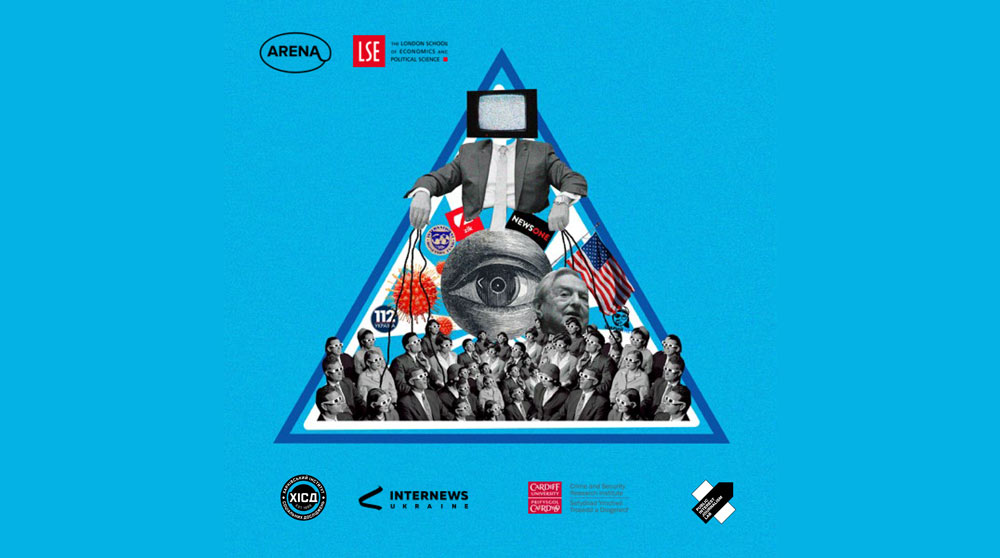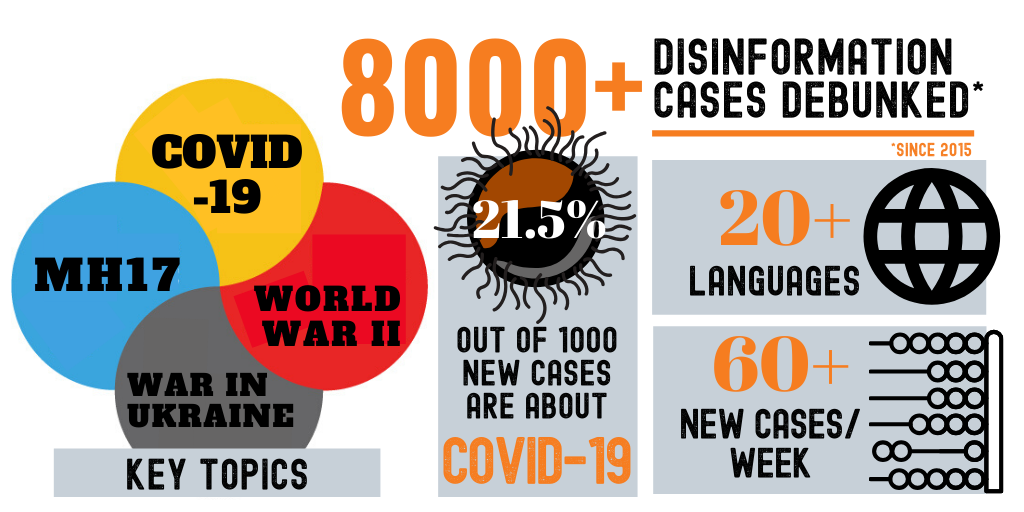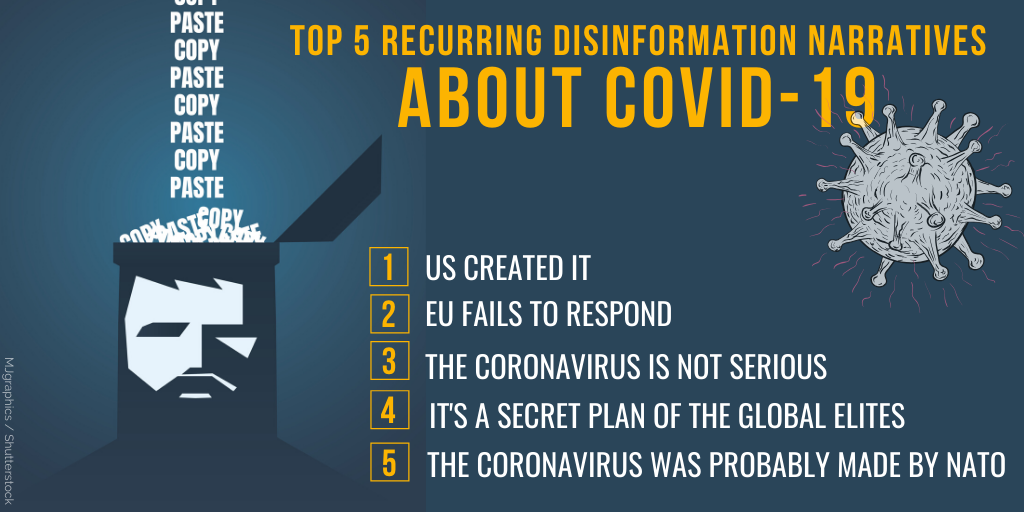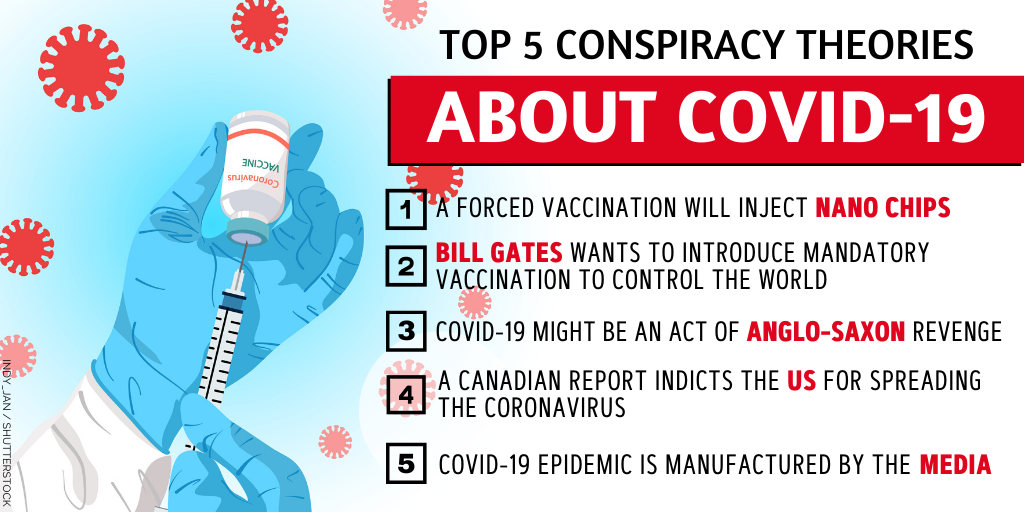Authors of the recent report entitled "Why Conspiratorial Propaganda Works and What We Can Do About It" have explored the issue of conspirational propaganda in Ukraine and found the ways how the pro-Russian conspiracies permeate society and how effective pushing conspiracy theories is in the country. Combining media monitoring, surveys, and focus groups, the researchers explored the vulnerability and resistance of audiences to conspiratorial narratives.
The research was a joint project by Arena, Cardiff University, Internews Ukraine, Public Interest Journalism Lab, and the Kharkiv Institute for Social Research.
"40% of Ukrainians believe that their country is governed from abroad by Western curators and the so-called Soros allies and this figure is actually bigger if you go to the south of Ukraine, to eastern Ukraine, to Donbas. In Donbas, about 61% believe this narrative," said Volodymyr Yermolenko, director of analytics at Internews Ukraine, opening an online presentation of the report.
How the conspiratorial narratives are delivered
The conspiratorial narratives come from multiple sources. Among them, the report names traditional and online media located both outside and inside Ukraine. Other sources are the politicians openly aligned with the Kremlin and those seeking to undermine reforms.
A significant part in propelling the conspiracies is played by social media personalities, "with pro-Russian YouTubers particularly important" as the report notes. Telegram, an instant messaging service, "acts as a crucial amplifier."
- Read also: Telegram: the Russian messaging app at the heart of a major influence operation in Ukraine
The Russian propaganda's conspirational narratives are very flexible and adaptable for different platforms, according to Vitalii Rybak, Internews Ukraine's analyst who had prepared the monitoring part of the report.
"People who launched these narratives understand that different age groups basically consume different media and get news from various sources, meaning, for instance, in Ukraine 40 plus year olds are still getting news from evening news on TV and young 25-30 year old people are now mostly getting used to social networks or news websites," Vitalii Rybak said at the presentation.
Citing the results of an InMind survey, the report mentions that TV remained the most popular medium in Ukraine until 2019, when "online and social media surpassed television in terms of popularity and reach": 68% of those polled used social media for getting news in 2019, as compared to only 53% in 2018.
Findings: major narratives and susceptible audiences
In his comments, one of the report's authors, Peter Pomerantsev who is the Senior Fellow at Johns Hopkins University and the director of the Arena Programme, commented on Russian propaganda's conspiratory narratives,
"It's hard for Kremlin propaganda to say how great Russia is all the time, for in Ukraine for obvious reasons even its proxies like Mr. Medvedchuk, who was until recently a major media holder in Ukraine, would find that narrative hard to push... so we've seen a shift... a shift towards narratives that aren't so much pro-Russian as anti-everyone else anti-West and infused with conspiratorial world views."
Nevertheless, this shift in the narratives doesn't mean that the Russia-praising died out, and as another co-author of the report Inna Borzylo, a researcher at Public Interest Journalism Lab, pointed that approximately half of the Kremlin propaganda narratives "are still praising Russia as a good alternative to the rest of the world" with its second half being anti-Western.
The study found that the most prevalent conspiratory narratives in Ukraine are:
- Ukraine being covertly under the external Western governance, which includes some curators, creditors, and “Soros minions” or "Sorosites." The report found that some 40% of the Ukrainian population believe or tend to believe this.
- American philanthropist George Soros and the International Monetary Fund willing to exploit Ukrainian lands. Almost the same number of Ukrainians - 39% - believe this narrative or lean towards it, according to the report.
- The US having deployed a network of bio labs in Ukraine to experiment on people. Every fourth respondent or 25% of those surveyed believed or rather believed this conspiracy.
As per the report, 39% of Ukrainians believe that “EU integration brought no benefits to Ukraine.” Moreover, the Kremlin-aligned sources present the EU as a “greedy creditor,” while spreading false claims that Ukraine "trades more with Russia than the EU."

"The aim of these narratives [is] to not so much make Russia look great but sort of equalize the West and Russia, undermine reforms [in Ukraine], undermine trust," noted Peter Pomerantsev.
Ukraine's south and east, supporters of a pro-Russian party are more susceptible
In the run-up to the October 2020 local elections, the Center for Security Studies (CSS) at ETH Zurich conducted polling among different demographics in Ukraine in order to explore the traction of anti-West conspiratorial narratives. The data of the survey showed that half of the supporters of the pro-Russian parties in Ukraine, Opposition Platform - For Life and Party of Shariy, are likely to believe anti-Western conspiracies.
Regionally, about half of the Ukrainians in the country's south and east believe or tend to believe that Western curators control Ukraine and that Soros with IMF want to exploit the Ukrainian lands, which is some 20% higher than in Ukraine's west and center, where around 30% have the trust of various degree in these narratives.

(Note: Donbas is considered as a separate region and the non-government-controlled territories are listed separately as well).
Pro-West center and west aren't immune
Focus group research carried out by the report authors showed that people across Ukraine are generally vulnerable to conspiratorial narratives, including those living in the largely "geopolitically pro-West" center and west of Ukraine.
Widespread distrust in society enables conspiracy theories to gain traction even among West-aligned Ukrainians. There is concern that for the Western support that is necessary "Ukraine 'will have to pay a very high price' in the end," the report says, and this view is pervaded by the belief that “nothing comes for free.” Moreover, "such views are partly reinforced by hundreds of years of harrowing Ukrainian history" as many Ukrainians adopted a “survivalist” mentality often seeing the world in terms of "brutal zero-sum interests."
Another finding of the focus group research is that "a low sense of agency is often related to conspiratorial mindsets" as people who believe they control little around them tend to believe that some hidden forces control the world. This is complemented by the data of to CSS survey that revealed that 68% of Ukrainians agree that “there are secret organizations that greatly influence political decisions.”
Signs of resistance to Kremlin propaganda
Nevertheless, the CSS poll also shows positive signs of resistance to the aims of pro-Kremlin propaganda among Ukrainians. The survey data showed that:
- about 80% of Ukrainians believe that Ukraine "should pursue closer relations with the EU";
- 61% see Russia as the biggest threat to Ukraine against only 15% of those seeing the US as the biggest threat.
"In a dog-eat-dog world, the Kremlin is still seen as the most malign dog," the report reads.
What is more, according to other Arena research cited in the report, with a general distrust in their government, media, and state, Ukrainians still have high levels of trust in civil society and volunteers.
How to turn negative into positive
The researchers believe that the "seemingly negative 'survivalist' Ukrainian mentality can, however, be turned into a positive" if the "personal survival" would be connected to broader national survival as "national cohesion, reforms, and international
connections can reinforce Ukrainians’ sense of personal security."
The distrust of Ukrainians can also turn positive since, the report says, focus groups showed that people often use different sources to come to their own conclusions which shows the emergence of "a more media-literate media consumer." The researchers suggest that the international community and the Ukrainian government need "to explain how reforms and international integration can strengthen security and survival."
"Conspiracy works because people are looking for an explanation what's going on, so let's not just fight fakes but let's do explain why these reforms are in process actually, what impact they make on your daily life," said Inna Borzylo.
As per the report, greater online civic participation in government would improve people's agency tackling the "root causes of conspiratorial thinking."
Meanwhile, the report encourages Ukrainian media to promote trust and empower audiences to "help move beyond conspiratorial mindsets."
Watch the presentation of the report:
The full text of the report is available in PDF format on arenaresearch.org.
Further reading:
- Ukraine takes long-overdue action against major domestic pro-Russian actors
- Coronavirus is not a biological weapon. It’s an information one
- New poll results suggest where Russia and Ukraine are heading (2019)
- More than half of Ukrainians see Ukraine’s future in EU, only 13% with Russia: Poll (2019)
- Majority of Ukrainians optimistic about country’s politics for first time in country’s history (2019)
- ‘Overwhelming majority’ of urban Ukrainians patriotic, poll finds (2018)
- How Russia uses think-tanks to promote its foreign policy agenda






